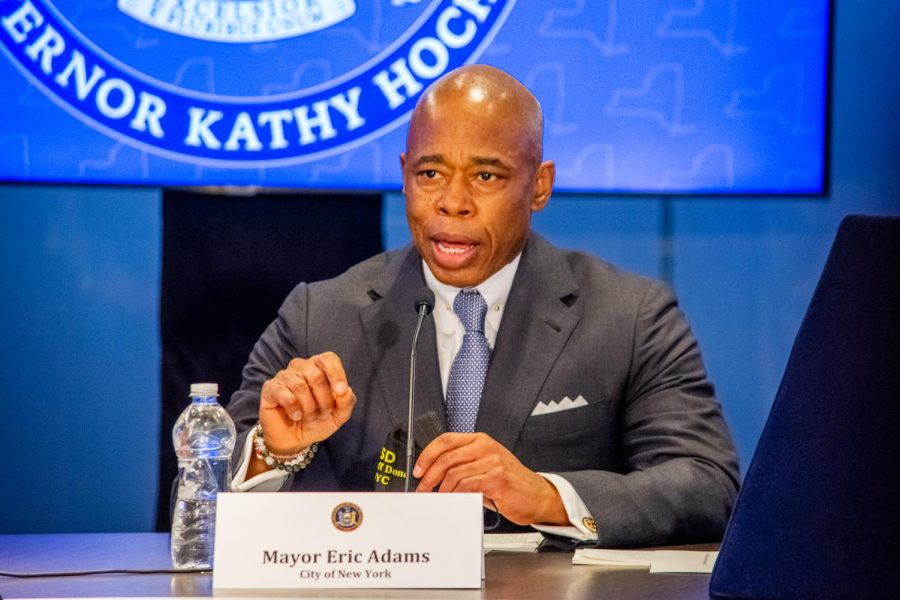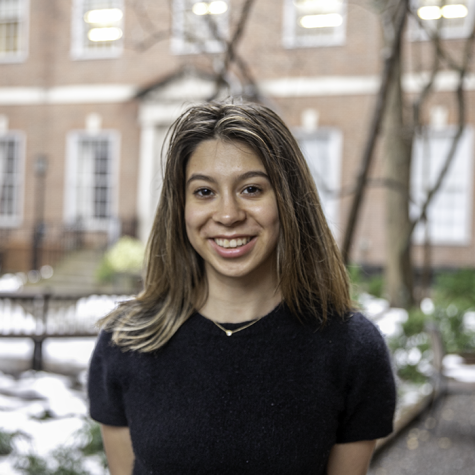Confronting food insecurity is the key to improving NYC’s health
Mayor Eric Adams has made nutrition a key component of his platform. However, to make lasting improvements to New Yorkers’ health, he must address the issue of food insecurity.
Mayor Eric Adams has proposed several new initiatives that target the city’s distribution and advertisement of nutritious food. Throughout his campaign, the mayor promised to combat food insecurity and bring food equity to the Bronx and Brooklyn, which experience higher rates of food insecurity and poverty compared to other boroughs. (Staff photo by Manasa Gudavalli)
March 4, 2022
Despite a brief affair with fish at Rao’s, Mayor Eric Adams is bringing his passion for plant-based foods to city hall and embarking on a quest to improve the health of New Yorkers. The new mayor has enacted two executive orders that target how the city distributes and advertises nutritious food and introduced a public school program “Vegan Fridays.” These actions are a great start at shaping the diet of the Big Apple. But if Adams wants to effectively address the high rates of chronic illness that plague the city, he’ll have to target food insecurity.
Studies have shown that people who experience food insecurity — a lack of consistent access to adequate food — are more likely to develop chronic illnesses, such as diabetes and cancer, than individuals with higher food security. As of 2017, nearly 1.09 million New Yorkers experience food insecurity, with residents of the Bronx facing higher rates than residents of other boroughs. COVID-19 exacerbated this issue, causing food insecurity rates to increase by 36%.
Mayor Adams is no stranger to this issue. Growing up, the mayor witnessed first-hand how a lack of affordable nutritious food worsened his mother’s health.
“[The city government was] giving her overprocessed cheese, powdered milk, canned meat … little did she know that was going to feed her diabetes, heart disease and arthritis,” Adams said at a press conference in the Bronx.
Many other New Yorkers experience similar health issues exacerbated by food insecurity. More than half of New York City residents are obese. Meanwhile, 987,000 residents have diabetes — but 19% are unaware of their condition. Adams’ recent executive orders took a stab at food insecurity by providing healthier options at city-run agencies, but to truly get to the meat of the matter — in a vegan way, of course — he’ll have to target poverty, the root of food insecurity.
“Being poor on its own is demonstrably bad for health in our society,” food policy expert Marion Nestle wrote in an email to WSN. “It prevents people from having access to healthier foods … time for physical activity [and] access to adequate education and health care. Food insecurity falls right in the middle of all that and increases the stress of daily life.”
Nestle, a former NYU professor of nutrition, food studies and public health, suggested that the mayor should focus on improving citywide socioeconomic development, such as affordable health care and jobs. Nestle also argued that he should provide education campaigns in order to promote other steps for addressing food insecurity.
“I’m all for promoting community gardens, cooking classes, farmers markets, regional food systems, and other methods to bring healthier foods into the city at a cost that people can afford,” Nestle wrote.
Poverty and food insecurity go hand in hand. Without addressing these problems, the mayor cannot expect the health of the city to change much. We need look no further for a cautionary reminder than former Mayor Michael Bloomberg, who proposed a series of controversial policies that didn’t affect the high calorie consumption of some residents.
Throughout his campaign, Adams promised to address food insecurity and bring food equity to the Bronx and Brooklyn, which experience higher rates of food insecurity and poverty compared to other boroughs. According to Nestle, it’ll take a few years to fully examine the extent to which the mayor’s policies and initiatives reduce food insecurity and rates of chronic illness and obesity. For now, the only thing we can be certain of is the eccentric mayor’s dedication to promoting a plant-based diet among New Yorkers — with the occasional fish dinner.
Contact Gabby Lozano at [email protected].




























































































































































